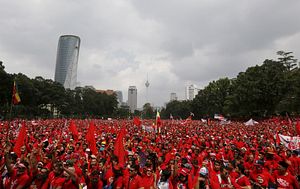Contemporary Malaysian politics are not only marked by political parties’ rivalries, but also characterized by escalating social protests and movements with contrasting demands.
The trend of countermobilization in Malaysia is not new. For example, as a response to the Coalition for Clean and Fair Elections (Bersih) rally in 2011, conservative Malay group Persatuan Pribumi Perkasa (Perkasa) launched a counterprotest initiative under the name of Gerak Aman, or Peace Movement. Responding to Bersih 2.0 and other movements fighting for human rights and civil liberties, these countermovements aimed at defending the dominant race (Malays) and religion (Islam) against ethnic minorities in the country.
Bersih 2.0’s nationwide convoys, which commenced on October 1 ahead of its planned mass rally on November 19, have been marred by interruptions and also scuffles involving the opposing Red Shirts, led by Sungai Besar United Malays National Organization (UMNO) chief Jamal Yunos. As I argued previously, there is chance that violence could possibly ensue this time around, partly due to the disruptive tactics employed by the Red Shirts. From their slogans and actions, it is easily seen that the Red Shirts are vying for political and societal attention for their views, which oppose those of Bersih 2.0.
From the Red Shirts’ perspective, Bersih 2.0 is anti-Malay, anti-Islam, and dominated by ethnic Chinese who support the opposition political parties. Ultimately Bersih 2.0 and the Red Shirts alter the political landscape in which they both operate by directly challenging each other as well as creating or stifling future political opportunities available.
The mobilization of a countermovement like the Red Shirts brings its own challenges. The fact is that certain members of a patronage network may seize the opportunity created by massive mobilizations to promote their own interests. Hence, countermovement mobilization will be difficult and slow unless the Red Shirts can articulate an ideology that arouses public enthusiasm and creates long-term commitment.
Meanwhile, a countermovement may be delayed if they suffered from a lack of resources. A countermovement’s level of “recognition” in society is very often one of the key determinant factors in the availability of resources. Usually, movements are launched by groups from “below” and attack established interests. Since they respond to these attacks, countermovements will often be linked to the established order, which can either help or hinder the provision of the required resources.
Hence, the question now is will Red Shirts wield any influence on Malaysian politics? To answer this question, it is crucial to look at the reaction of the state authorities toward the Red Shirts. The authorities’ actions – whether to suppress or tolerate Red Shirts – could affect the intensity of Red Shirt activity directed against Bersih 2.0. That, in tern, will eventually decide on the extent of the countermovement’s influence in Malaysian politics.
In this case, the authorities have responded to the Red Shirts in differing ways. UMNO Secretary General Tengku Adnan Tengku Mansor, also known as Ku Nan, has warned that clashes between the Bersih and Red Shirt group could lead to riots. While some other UMNO leaders, such as Khairy Jamaluddin, have condemned the acts of Red Shirts, at the same time they also do not agree with allowing Bersih 2.0 to hold its rallies. Recently, Malaysian Deputy Home Minister Datuk Nur Jazlan Mohamed was quoted as saying that the controversial Red Shirts will stop their actions if Bersih 2.0 stops their rallies.
As for the police, Inspector General of Police Tan Sri Khalid Abu Bakar said both Bersih 2.0 and the Red Shirts would be investigated over their failure to notify the police regarding their respective gatherings. He said that they would be investigated under the Peaceful Assembly Act for organizing convoys and assemblies without following procedures as stipulated under the law.
These differences in the approach to “regulation” countermovement activity result from different political calculations by these public officials. The interaction between the Red Shirts and Bersih 2.0 increases when the state enables but, at the same time, is not able to satisfy challengers. This could be the case the Malaysia is currently in, based on its vulnerable political climate. Whether increased fears of political crisis are justified is debatable. But it is important to understand that such fears are difficult to articulate, simply because the worries are not due to one single event, but from an accumulation of trends.
Dr. Khoo Ying Hooi is Senior Lecturer at the Department of International and Strategic Studies, Faculty of Arts and Social Sciences, University of Malaya.

































